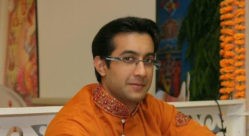Pt. Varistha Persad, Director, SWAHA International
As violent and abrupt changes disrupt world religions, festivals, rituals and mass gatherings, legitimate concerns force leaders to fight the conditions of the new normal in their communities as they attempt to retain their followers as their main priority. Unfortunately, most leaders are finding it difficult to revamp and develop new methodologies for antiquated practices and beliefs. In so doing, the psychological and mental stability of societies following such leaders of religion, begin to degenerate into extremism and rebellion. As the oldest religion, the focus of Hinduism has always been on desh, kaal, avasar (time, place and circumstance) for determining the rituals, practices and spiritual development of Sanatanists.
Sanatan Dharma, defined more so as ‘a way of life’ than religion, is philosophically rooted in the understanding that change is constant. As we come to terms with the very upsetting changes in a pandemic: closed temples, cancelled events and virtual discourses, we are constantly being tested but rightfully so, to change the way we approach our worship to the Divine. In the Ramcharitmanas, we are reminded of Vibhishan, whose home was a beacon to Hanuman Baba and an oasis in the cursed villages and cities of Lanka. In spite of the external conditions and the isolation Vibhishan faced, he made his home his temple. Similarly, as we are no longer able to attend the temples, we are asked instead to focus on our homes and families. This physical shift is refreshing as pundits have been advising constantly that the change we need to make must start from inside and in the home. The family that prays together, stays together.
Unfortunately, in our society, many have been contented with performing puja once every year, only attending temple for Shiva Raatri, Krishna Janmasthami, Ram Naumi, Hanuman Jayanti and other special occasions. This pandemic is allowing Hindu brothers and sisters to accept their daily duties and obligations with renewed vigour and commitment. In this month, especially where the worship of Ganesha Baba is done with pomp and ceremony, Lord Ganesh is that form of the Divine that helps us redefine and question our existence in this world. He is the symbol of he who has discovered Divinity within himself.



